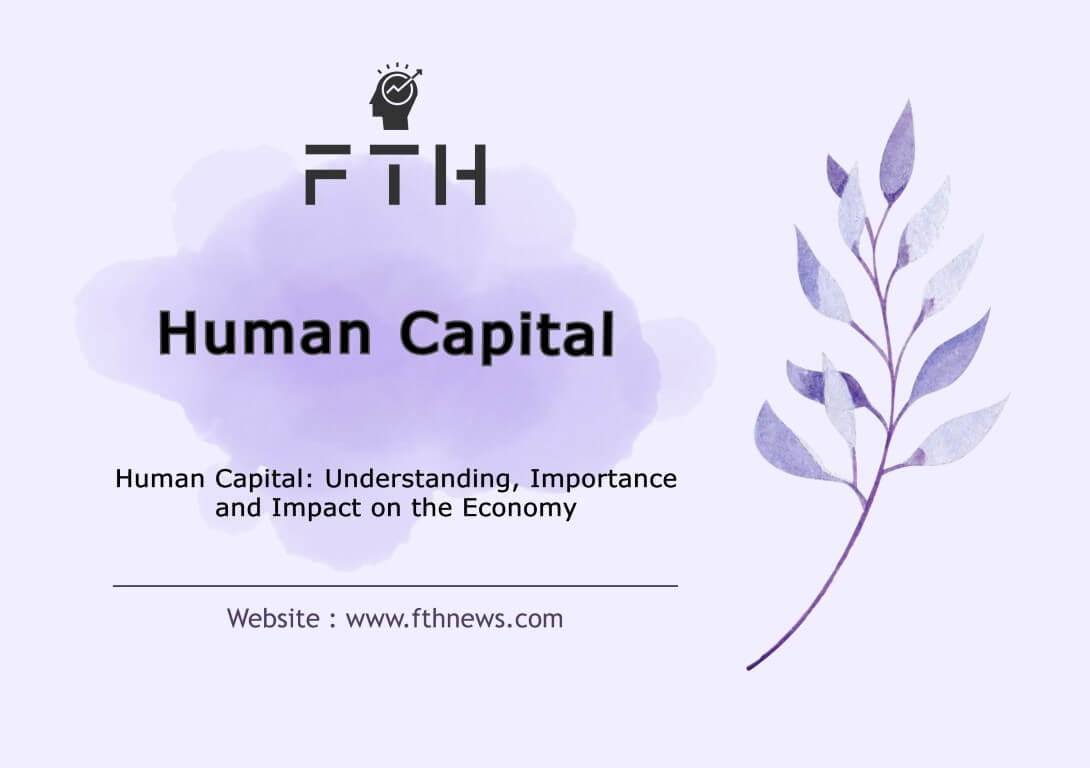
Human Capital: Understanding, Importance and Impact on the Economy
In the landscape of today’s global economy, “human capital” stands as a pivotal term often echoed in discussions around a country’s economic framework. While diverse definitions exist for this concept, they all converge on a fundamental essence.
For some, human capital embodies the inherent power or capabilities an individual must cultivate and apply to generate goods or contribute to society. This dynamic force not only enhances personal proficiency but also betters the social fabric of the community at large. Typically, advanced industrial nations boast robust human capital, where each active member of society possesses one or more specialized skills.
Alternatively, another perspective defines human capital as the qualitative attributes of individuals, deeming these characteristics as not just inherent qualities but as assets capable of generating wealth.
In essence, human capital encapsulates a blend of experiences, genetic predispositions, creative inclinations, acquired skills, and inherent abilities accumulated throughout an individual’s lifespan.
A holistic comprehension of human capital underscores its formation as a composite of knowledge, skills, expertise, and capabilities within individuals, all contributing to amplifying income, service quality, and production levels.
In the subsequent sections, we delve deeper into the multifaceted effects of human capital across various domains. Furthermore, we explore its critical importance, the evolving ideologies surrounding it, and the pivotal aspect of its management.
Defining Human Capital: The Intellectual Asset
Capital in organizational terms typically refers to assets that facilitate profit generation or progress toward set objectives. Machinery, tools, and equipment are common examples. However, human capital differentiates itself as the collection of knowledge and skills inherent in individuals, utilized by an organization to propel its objectives forward.
In simpler terms, human capital stands in contrast to physical capital such as property, equipment, and financial assets. This economic concept amalgamates “capital” and “human,” encapsulating employees’ stored knowledge, skills, qualifications, and abilities primarily acquired through education. These factors significantly enhance work quality and amplify economic value within the labor market. From a managerial standpoint, human capital is a resource or asset shaped by market value.
Within the realm of macroeconomics, human capital is viewed as one of the fundamental production factors. Its significance lies in its relation to the economic growth trajectory. Contemporary economic growth theories position human capital as the composite of both acquired and innate skills within an individual.
Renowned economist Armstrong characterizes human capital as the knowledge and skills that define and empower an individual’s uniqueness. This perspective emphasizes the pivotal role of individuality in contributing to the overall capital resource of an organization.
The History of Human Capital
The genesis of human capital within economic discourse can be traced back to different pivotal contributors. In 1954, Lewis introduced the concept of economic development, intertwining it with the notion of unlimited labor density within economic literature. However, the concept of human capital remained relatively dormant due to its initial association as a mere production factor akin to machines and tools, until Cecil Pingo’s introduction in 1956.
Cecil Pingo’s pivotal presentation marked the first formal emergence of the term “human capital.” Following this, the exploration of It gained momentum in the research works of neoclassicists, particularly in the research by Mins. Notably, Mins delved into the theme of investment in human capital and its correlation with personal income distribution in an article published in the Journal of Political Economy in 1958.
Subsequently, Schultz played a significant role in propelling the development of the concept of human capital. His seminal contributions greatly enriched the discourse on it. Yet, it was Gary Becker who can be credited for bringing it into the limelight within economic literature. In 1963, Becker published a groundbreaking book bearing the title “Human Capital.” This seminal work became the cornerstone and standard reference for numerous studies conducted in this field, propelling the discussion and exploration of it to new heights.
The contribution of these distinguished individuals marked a paradigm shift, establishing it as a fundamental and pivotal element in economic discourse, revolutionizing the way economists and scholars perceive and analyze the value of knowledge, skills, and individual capabilities within the economic framework.
How to Measure Human Capital: Understanding its Vital Significance
Understanding the intricate measurements of human capital stands as a crucial endeavor in comprehending its true worth. The assessment of human capital transcends mere acknowledgment; it offers a profound glimpse into a society’s or a nation’s potential and productivity.
At the forefront of this evaluation lies the esteemed Human Capital Index, an annual report curated by the World Bank. This index, scaling from 0 to 1, serves as a compass guiding us towards comprehending the foundational productivity encapsulated within human capital.
Join us as we embark on a journey to unravel the methodologies, indices, and approaches utilized to gauge the robustness of human capital. Discover the intricacies of this assessment, paving the way to comprehend how nations harness their most valuable resource.
Human Capital: A Catalyst for Economic Progress
The link between the development of human capital and economic progress stands prominently evident in the economic landscape of advanced nations. Human potential and capabilities play a pivotal role in harnessing a country’s physical resources to their fullest. For instance, the surge in a country’s gross domestic product (GDP) between 2000 and 2012 can be directly attributed to the concurrent improvement in the literacy levels of its populace.
Entrepreneurship and the Human Capital Nexus
Entrepreneurship and the birth of new enterprises hold a crucial place in the evolution of any society. Fresh ideas wield an inherent allure, fostering a vibrant environment for societal progression. Successful entrepreneurship hinges on the adept utilization of opportunities and abilities embedded within human capital, driven by innovative thoughts and ideas.
Human Capital’s Role in Addressing Poverty
The dire relationship between societal poverty and the state of human capital, especially concerning health and skill deficiencies, is palpable. Governments often take the foremost step of bolstering the economy by prioritizing education and healthcare. Elevated health and educational standards invariably elevate productivity, thereby serving as a catalyst in resolving economic challenges and eradicating poverty.
Human Capital’s Impact on Organizational Success
The success of an organization intertwines intricately with the efficacy of its human resources, affecting core operational facets such as financial stability, operational efficiency, and innovation. The caliber and proficiency of human forces influence these elements profoundly. Consequently, organizations striving for excellence invariably prioritize the continuous development and enhancement of their human resources.
Human Capital and Its Catalytic Factors
As highlighted earlier, the evolution and elevation of human capital have a ripple effect, triggering shifts in other institutions and catalyzing transformations within economies and production systems. Advancing a society’s economy necessitates not only identifying existing deficiencies but also delving into the factors that underpin the growth of this pivotal asset. Traditionally, education and healthcare stand recognized as pivotal influencers in elevating human capital.
The Importance of Human Capital
In the intricate tapestry of economic progress, the linchpin rests upon human capital. While tools and machines facilitate organizational and production activities, the very trajectory of a country’s economic advancement intertwines intricately with its human assets. Expertise and skill among individuals serve as the pulsating heart of both societies and nations, their existence forming the bedrock of societal survival.
The import of human capital lies in its ability to propel societal growth. However, this impetus materializes when human capital demonstrates optimal effectiveness, efficiency, and productivity—where the active forces within a society embody creativity, knowledge, experience, and skill.
Each facet of a society’s human capital, akin to tangible resources like mines and energy sources, possesses the capacity to generate wealth. However, this is contingent upon leveraging these resources at the opportune moment with adequate skills and knowledge. Moreover, beyond economic prosperity, these reservoirs also fortify societal security.
Consider a simple yet compelling example:
The genesis of the world’s first automobile traces back to Germany, a nation that still boasts some of the largest and most distinguished automotive companies globally. This country consistently produces technologically advanced and high-quality vehicles.
Why does Germany maintain a prominent status in the automotive industry? Undoubtedly, the exceptional human resources within the country play an unequivocal role. Germany’s prowess in automotive engineering and its outstanding presence in the automotive industry owe much to the creativity, knowledge, and experience ingrained within its human workforce.
Schultz’s Theory of Human Capital: Transforming Knowledge into Economic Growth
Theodore Schultz, a distinguished American economist and recipient of the Nobel Prize in 1979, undertook a seminal exploration of post-World War II economic landscapes, particularly focusing on the rehabilitation and resurgence of war-torn Germany and Japan during his tenure as Chief Economist at the University of Chicago.
His comprehensive study revealed a pivotal insight: the resurgence and escape from poverty by these nations were intrinsically tied to the overall health of their societies and the educational attainment of their people.
In his seminal work, Schultz proposed a groundbreaking theory known as “investment in human capital.” This theory posited that by investing in education and healthcare, societies could transform what might be perceived as unproductive aspects of human potential into highly productive capital.
Central to Schultz’s theory was the notion that individual knowledge and skills represent a unique form of capital. By investing in human capital—be it through education, healthcare, or the development of skills—an increase in both production and income could be achieved. This theory essentially underscored the economic value inherent in nurturing and developing the capabilities of individuals within a society.
Schultz advocated for a societal commitment wherein all members actively engage in the investment of their own skills, personal hygiene, and overall health. This proactive investment in oneself, as per Schultz’s theory, would not only benefit the individual but also contribute to the economic growth and stability of the entire society.
Human Capital Management: Maximizing Organizational Potential
Human capital management encompasses the strategic and comprehensive oversight of an organization’s workforce, serving as a linchpin in driving its overall productivity. At its core, this management domain revolves around the efficient administration of an organization’s employees.
Fundamentally, human capital management focuses on optimizing the organization’s most critical resource: its employees. Consequently, this department places immense emphasis on initiatives aimed at enhancing the knowledge and skill sets of the workforce. The overarching goal of this management is to effectively mold and harness human resources into vital assets, thereby bolstering the organization’s potential.
This unit shoulders multifaceted responsibilities, including recruitment, training, supervision, organization, and retention of employees. Each employee’s growth and development within the organization hinge significantly on the efficacy of this management unit.
Distinguishing Human Resources from Human Capital
While seemingly synonymous, the terms “human resources” and “human capital” differ notably in essence. Human resources refer to employees who work within an organization for a certain period. On the other hand, human capital embodies a perpetual force, encompassing skills, knowledge, and power that are continually honed and cultivated. The distinction is evident in their nature: human resources are finite and non-renewable, whereas human capital thrives as a renewable resource, constantly evolving and contributing to future wealth and prosperity.
Some viewpoints categorize human resources as a subset of human capital. When the workforce of an organization aligns with its objectives and strategies, they transform from mere resources to valuable human capital.
Human capital stands as the most crucial capital for any country, denoting a reservoir of knowledge, skills, expertise, and abilities vested within its people. This asset’s paramount importance lies in its capacity to leverage and optimize other resources, acting as a catalyst for overall prosperity and wealth generation.
Maximizing Potential for Prosperity
The potency of human capital management lies in its ability to mold, refine, and maximize the potential within a workforce. By honing skills, nurturing talent, and aligning human potential with organizational goals, this management domain becomes the cornerstone in fostering not just individual growth but also economic progress on a broader scale.
Fostering the Growth of Human Capital
As previously outlined, human capital embodies a synthesis of strengths, experiences, skills, and expertise intrinsic to individuals. The elevation of human capital primarily thrives on two fundamental avenues: the continuous update of knowledge and skills and the transmission of experiences to successive generations.
Methods for Human Capital Development
The augmentation of human capital stands as a chief driver of economic wealth generation, hence rendering the development of human capital a matter of paramount importance for governments worldwide. Several pathways contribute to its development, notably enhancing cognitive abilities, bolstering self-confidence, expanding skill sets and competencies, and the transfer of experiential knowledge.
Understanding the Human Capital Index
The Human Capital Index, a notable report published by the World Bank, acts as a yardstick for evaluating countries based on their specialized skills and economic proficiencies. This index serves as an indicator not only of a country’s strengths but also highlights the impact of insufficient education and healthcare on its overall capital.
This index measures between zero and one, where a value closer to unity signifies a higher utilization of human capital talents within a society. The proximity to one denotes an increased level of exploitation of human capital, accentuating the country’s proficiency in harnessing the skills and expertise of its populace for economic growth.














